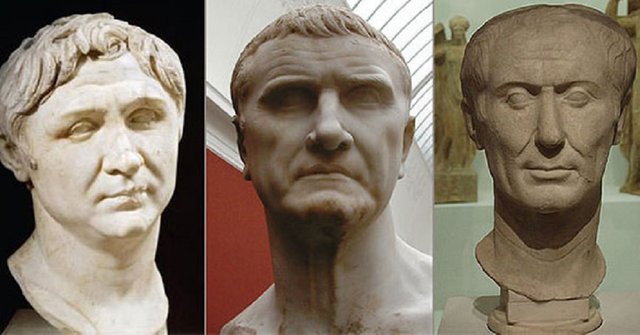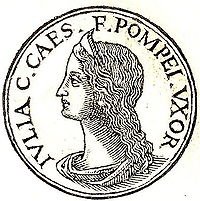The First Triumvirate: A "Three-Headed Monster"
Julius Caesar was moving up in the Roman world and he knew that in order to secure more power, an alliance needed to be made. One that would benefit not only himself, but his closest allies as well.

Taking Control
Caesar was the force behind the first triumvirate, created in 60 B.C. that included Crassus and Pompey. This spelled disaster from the very beginning since Pompey and Crassus hated each other. In the last decade all that they had done was trying to get at each other, like blocking each other's desires in the Senate. There was a lot of bad blood due to the incident with Spartacus after Pompey took all the credit for Crassus' efforts.
However all three wanted something, so they agreed to an alliance. Pompey was motivated to get land for his veterans and protect those that fought loyally. Crassus wanted to help his clients so that they didn't have to pay as much in taxes. Caesar only wanted money to pay off his debts and establish himself in Rome. In order for him to achieve this, he decided he wanted to become wealthy by gaining the position of Proconsul. First, as consul, he illegally used his power to push the agendas of his allies. For instance, if his laws were rejected he would use back street channels to put them in place. He also used plebiscites to give land to the veterans and reduce the tax burdens on Pompey's clients.

By law, people holding office could not be prosecuted so Caesar's goal was to never leave office. If he kept holding office then he would be immune to prosecution, if not then the government would charge him for all of his crimes. For a while things were good for Caesar, even if Pompey and Crassus were not very fond of each other, he did find a way to cement a relationship with one. Caesar married Pompey to his only legitimate child, Julia. She was quite young while Pompey was much older, however he had a reputation for treating his wives very well.

At the end of Caesar's consulship in 59 B.C. he received a 5 year command as Proconsul in Gaul, which meant five more years he could not be put on trial, plus a military he controlled. He was so successful in defeating the Gauls that the Senate declared 15 days of thanks giving, where everyone in the empire would laud and praise his name. Pompey and Crassus were bitter and jealous about this but while Caesar was gone, they were trying to seal up their power in Rome.
Decline
In 54 B.C. things go really badly. Julia dies in childbirth and Caesar blames Pompey for this, however he tried to salvage this political alliance by offering another female relative for Pompey to marry. He rejects, which is a direct rejection to the alliance. Crassus in the meantime decides he wants to take his own reputation. While he may have been the richest man in Rome, recently he has been a disappointment. He chose to go to Parthia in Mesopotamia, along with 40,000 men. Unfortunately it does not end well for most of them. Crassus did not survive - his head was cut off and placed on a pike. His death was not a good thing for Caesar and Pompey since it is much easier to have three fighting for power than just two.
Now the Senate was growing concerned with Caesar and requested that Pompey protect Rome. Once he agreed, the Senate demanded that Caesar leave his post in Gaul and return to Rome. Of course, Caesar understood what would happen if he complied. He was supposed to cross the Rubicon river alone without his army, but on January 10 49 B.C. he brought his army with him, immediately inciting civil war. People fled en masse, including Pompey and most of the Senate. Caesar never killed anyone when he arrived, but he did begin his hunt after Pompey. Unfortunately he was killed and beheaded in Egypt, thinking he would find safe haven there. His head was pickled in a barrel so that Caesar could view it. Ancient history says that when Caesar saw this, he wept and punished everyone involved in his murder. Perhaps it was because of how horrifying it was to see, or maybe because it was his old friend and son-in-law.
Let fly the dice! -Julius Caesar upon crossing the Rubicon.